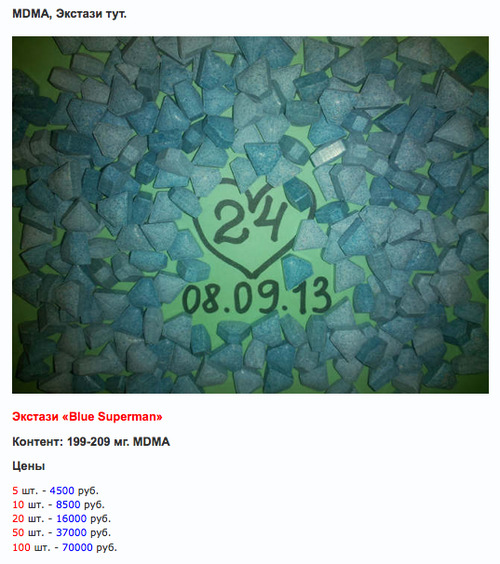The arrest of 29-year-old Ross Ulbricht in San Francisco may have spelled the end for Silk Road, but a similar Deep-Web drug exchange based in Russia is still alive and well.
The Russian Anonymous Marketplace, like Silk Road, provides a platform for dealers to sell illegal substances directly to customers over the web. It's smaller and scrappier than Silk Road—just a simple online forum where users post threads with information about their products. But there's hardly a lack of selection. Sellers offer everything from marijuana to amphetamines, sometimes attaching photos to prove quality and quantity.
 |
| MDMA for sale on the Russian Anonymous Marketplace |
Most buyers make purchases using Bitcoins, the online currency that rode Silk Road's success to soaring exchange rates over the past two years. Like Silk Road, many RAMP dealers send their product anonymously through the mail to the purchaser. But some sellers offer the option of a dead drop, leaving a package in an abandoned building or some other secluded location and then sending the coordinates to the buyer. Dealers seem to be located almost exclusively in major Russian and Ukrainian metropolitan areas—Moscow, Saint Petersburg, Ekaterinburg, and Kiev.
Like Silk Road, the site is tucked away on the anonymous Tor network, an online world out of view from major search engines and infuriatingly difficult for authorities to crack—at least until recently.
Silk Road may have finally been shut down by the feds, but with the community having grown and attracted followers from around the world during its two-and-half years of operation, it seems unlikely that all of its former users will simply give up on the idea of an anonymous online marketplace for drugs. In January, RAMP was home to a little under 6,000 users. Now the website boasts more than 16,700. It's unclear how many of those people made the switch from Silk Road after it was shuttered a few days ago, but it stands to reason that the website could see a significant number of Russian-speaking Silk Road users added to the community in the coming weeks and months.
If the demise of file-sharing platforms like Napster and LimeWire and the subsequent rise of BitTorrent clients are any indication, online communities targeted by the law have a way of regrouping and reemerging somewhere else. It will be interesting to see if the Russian authorities will show the same zeal as the US government at snuffing out RAMP and other similar services on the Deep Web, or whether, like the nearly universal disregard for copyright law in Eastern Europe, anonymous markets will prove a low priority for law enforcement and continue to flourish.
No comments:
Post a Comment